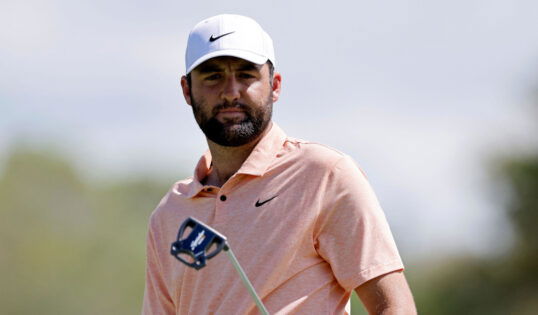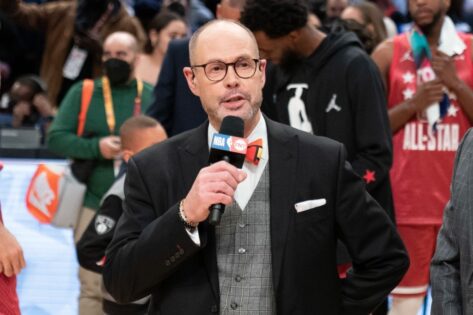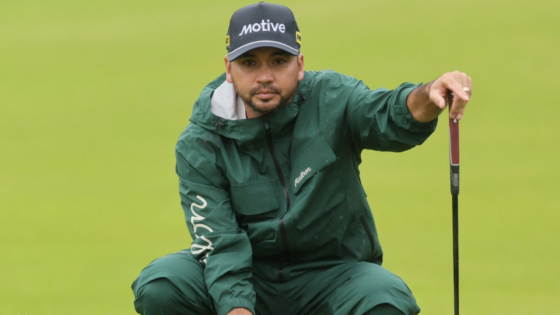Golf has always been a sport steeped in tradition. For generations, players have passed down time-tested methods that haven’t changed much since our grandparents’ era. Yet suddenly, we’re seeing all these newfangled approaches popping up on tour. Remember when reading a putt just meant walking around the hole, squatting down to check the line, and trusting your gut? Now we’ve got pros straddling putts, feeling slopes with their feet, and holding up fingers like they’re taking a measurement. It’s enough to make the old-timers shake their heads. Amid this technological revolution, top players like Scottie Scheffler are offering surprisingly candid perspectives on golf’s newest innovations.
Scottie Scheffler’s pragmatic stance reflects broader tech indifference
World No. 1 Scheffler raised eyebrows with his nonchalant response about distance measuring devices. “You’re not going to like this answer, but I kind of forgot about that,” Scheffler admitted during his RBC Heritage press conference. The defending champion’s indifference stands out as the PGA Tour conducts its first four-week trial of rangefinders in competition.
DMDs, primarily laser rangefinders, provide players with precise yardages to targets. They’re designed to speed up play by eliminating the need to pace off distances. The PGA Tour is testing them at select events, including the RBC Heritage.
Scottie Scheffler’s casual approach suggests he sees minimal benefit from the new technology. “I’ll trust Ted, what he wants to do. I don’t really care. He’s the one that gets the number,” the Masters champion explained about his caddie’s role. He believes the devices will only save “a few minutes” per round.
Mar 16, 2024; Ponte Vedra Beach, Florida, USA; Scottie Scheffler lines up a putt on the 18th green during the third round of THE PLAYERS Championship golf tournament. Mandatory Credit: David Yeazell-USA TODAY Sports
The world’s top-ranked golfer has maintained his focus elsewhere. He points to more meaningful pace-of-play solutions. “When you see the biggest changes in pace of play, it all comes from going from three guys to two guys in a pairing,” Scheffler noted. His pragmatic assessment differs from Jim Nantz’s more vocal stance against certain modern golf techniques.
While Scottie Scheffler merely shows indifference toward DMDs, Nantz has actively opposed AimPoint. The CBS broadcaster regularly criticizes the method during broadcasts for slowing down play. The contrast in their reactions highlights the different levels of controversy surrounding these innovations.
Recently, Min Woo Lee made headlines by playfully mocking AimPoint users. The Australian mimicked the controversial green-reading method after winning the Houston Open. He pretended to use AimPoint for an eight-inch tap-in putt, drawing laughs from spectators and fellow pros alike.
AimPoint is a green-reading system where players feel slope percentages with their feet. They then hold up corresponding fingers to determine the break. The distinctive finger-holding technique is highly visible during broadcasts.
Lee later revealed his actions were purely for entertainment. “Doing it for the people. Just for a laugh,” he explained on Dan Rapaport’s podcast. This playful mockery aligned with Nantz’s well-known criticism of AimPoint usage on broadcasts.
These contrasting reactions to golf’s new technologies reflect a broader trend in the sport. Players, broadcasters, and fans continue to debate the merits of traditional versus modern approaches.
Evolution of golf aids creates divide among players like Scottie Scheffler
Golf’s methodological evolution has transformed how players approach the game. From green-reading techniques to rangefinders, the sport has embraced various modern aids. However, this progress hasn’t come without controversy.
AimPoint has become particularly divisive. The method involves feeling slope percentages with your feet and using finger spacing to determine breaks. Critics believe it unnecessarily slows play, while DMDs face similar scrutiny regarding their actual impact.
Scottie Scheffler remains skeptical about significant improvements in pace. “Is it going to help pace of play? Maybe a few minutes. Will it be anything significant? No,” he concluded. His measured response exemplifies the practical approach many traditionalists take toward golf innovations.
The contrast between embracing new methods and honoring traditional approaches continues to define golf’s evolution. Scottie Scheffler’s indifference and Nantz’s opposition represent different sides of the same coin—a preference for golf’s fundamental skills over controversial modern techniques.
What’s your take on these modern golf techniques? Do they enhance the game or detract from the skill and artistry of golf? Let us know in the comments below!
The post Scottie Scheffler Joins Jim Nantz, Min Woo Lee as He Defends Use of Controversial Green Tools at RBC Heritage appeared first on EssentiallySports.



